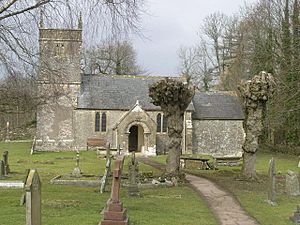Church of St Andrew, Holcombe facts for kids
Quick facts for kids Church of St. Andrew |
|
|---|---|
 |
|
| Location | Holcombe, Somerset, England |
| Built | 16th century |
| Governing body | Churches Conservation Trust |
|
Listed Building – Grade II*
|
|
| Official name: Church of St. Andrew | |
| Designated | 2 June 1961 |
| Reference no. | 1058677 |
| Lua error in Module:Location_map at line 420: attempt to index field 'wikibase' (a nil value). | |
The Church of St. Andrew is a very old church located near Downside Abbey in Holcombe, Somerset, England. It has roots going back to the late Saxon and early Norman times. The church was rebuilt in the 1500s, giving it much of its current look.
Today, the Church of St. Andrew is recognized as a Grade II* listed building. This means it's a very important historical building that needs to be protected. It is now a redundant church, which means it's no longer used for regular church services. Instead, it is cared for by the Churches Conservation Trust, an organization that saves historic churches across England. The Trust took over the church on August 1, 1987.
Contents
A Glimpse into History
The very first church on this site was blessed in the year 928. This was done by Archbishop Wrotard of York, a very important religious leader at the time. Imagine how much history this place has seen!
Church Design and Features
The Church of St. Andrew has a special design. It features a two-stage tower, which means the tower is built in two main sections. The church also has a two-bay nave, which is the main part of the church where people sit.
Inside the church, you can see some interesting historical pieces. There are late Georgian box pews. These are like individual wooden boxes where families would sit during services. You can also find a Jacobean pulpit, which is a raised platform where the preacher would stand.
Graveyard Stories
The church's graveyard holds many old memorials. One of these is dedicated to the family of Robert Falcon Scott. He was a famous explorer who led expeditions to the South Pole. His father used to manage the local brewery in the village.
There's also a very old yew tree in the graveyard. People believe this tree is about 1500 years old! It has stood there for centuries, watching history unfold.
Village Mysteries and Rhymes
The original medieval village of Holcombe was buried long ago, possibly during a time of widespread illness. The land around St. Andrew's Church still shows mounds. These mounds are thought to be evidence of this ancient burial.
Some people suggest that the famous children's rhyme 'Ring a Ring o' Roses' might have started here because of these events. However, there's another story too. An alternative idea is that the rhyme relates to a sad event in 1899. This was when five children from the village drowned in an icy pond.
More to Explore

